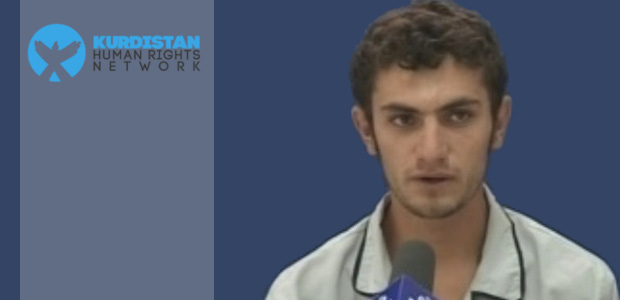
Saman Nasim, a Kurdish political prisoner, who was a juvenile when arrested a few years ago, has been notified by the branch 12 of the Ûrmiye Court that the status of his mental health and maturity at the time of his offense will be re-examined and the results will be sent to a court in the next two weeks.
A reliable source told the Kurdistan Human Rights Network (KHRN) that Nasim was summoned at the office of implementation of sentences of Ûrmiye Central Prison on 30 July, and that he was told his mental health and maturity at the time he committed his offense will be re-examined.
He was told that the court would receive the results in the next two weeks.
Nasim has already been through these examinations last year. Three people always accompanied him during the tests, the source said.
Judge Arab Baghi, who is the head of the branch 12 of Ûrmiye Criminal Court, had requested a review of Nasim’s psychological condition at the time of his arrest to determine whether or not he was aware of having committed the offense, for which he was arrested as a teenager and later detained until now.
“Three doctors of a forensic team had made a decision on 2 June, but the judge had not accepted it and sent the case for re-examination by five judicial doctors. ”
The source added that over the past few years, the looming threat of the implementation of Nasim’s death penalty caused international reactions.
He has been suffering from psychological trauma due to severe torture during his arrest and uncertainty over his fate, as he was taken to death row jail and prepared for execution in February 2015.
Nasim, born 20 September 1993, comes from the city of Merîwan.
IRGC arrested him when he was only 17 years of age in the border town of Serdeşt on 18 July 2011.
He detailed his prison conditions in a letter that went public in February 2015.
In his letter he said that his initial arrest “meant 97 days of torture and suffering. During this time, I was tortured everyday with everything. In the early days the torture was so brutal I was unable to walk. All my body was black and blue. They hung me upside down with my arms and legs tied to the roof for many hours. During interrogations, I was always blindfolded and unable to see my torturers. They used all inhumane and illegal methods to obtain confessions from me. They repeatedly said that they had arrested my family members and relatives too, my parents and my brother included. They also said that they would bury me like they did to my comrades. They told me that they would kill me right there [at the place they tortured him] and put cement on my grave.”
Regarding his death sentence, he wrote: “I was actually sentenced to death based on a ‘confession’ that had already been written [by them]. After receiving a death sentence from the Mehabad Court on 16 February 2013, I was transferred to Ûrmiye Central Prison, where I once again faced brutality and intimidation. The Supreme Court upheld my death sentence after two years. The prospect of retrial is unclear and I could be executed at any moment because my sentence was issued as a final verdict. “
In December 2013, the Supreme Court confirmed the capital punishment and Nasim’s lawyer was informed that the execution was scheduled to be carried out on 19 February 2015.
On 17 February 2015, Nasim and five other death row prisoners Sirwan Nejawi, Yunes Aghayan, Habib and Ali Afshari, Ebrahim Issapour, imprisoned together in Ûrmiye prison, were separated and transferred to different prisons.
Afshari and Habib were moved to Qazvin prison, while Nasim and Aghayan were taken to Zanjan prison, Nejawi and Issapour to Tabriz central prison.
From Zanjan prison, Nasim and Aghayan were taken to the detention center of the Iranian intelligence agency and they were detained in solitary confinement cells.
They were denied any rights of communications with their family and relatives for 120 days.
Their families were not informed about their fate and whereabouts.
Officials said both of them were at imminent risk of execution.
Nasim had asked to be executed as soon as possible on several occasions to put an end to the endless nightmare of not being able to bear the mistreatment at the solitary confinement cell, the uncertainty about his fate and being denied the right to communicate with his family.
After this time, which lasted four months, Nasim was taken back to Zanjan prison.
On 11 July 2015, five months after his disappearance at the hands of Iranian authorities in the most secretive way, he was allowed to call his family to inform them about his detention at Zanjan prison.
On 19 September 2015, he was moved to Ûrmiye prison, where he has since been imprisoned.
Kurdistan Human Rights Network ─ KHRN